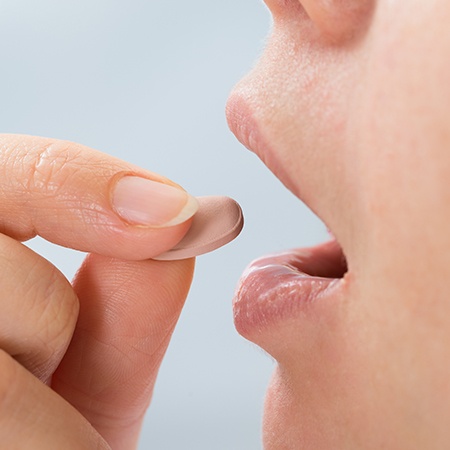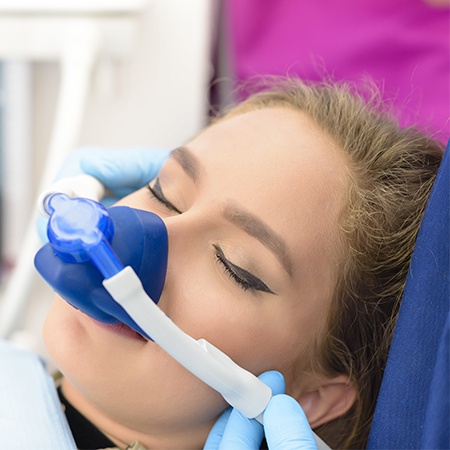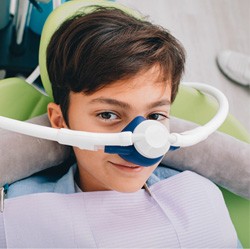Sedation Dentistry – Savannah, GA
No More Stress at the Dentist’s Office
You don’t need a degree in dentistry to know that many people don’t exactly like going to the dentist. In fact, some are completely terrified. At Compass Dental, our friendly team does everything they can to help our patients feel completely comfortable, and for those who are particularly anxious, we’re happy to offer sedation dentistry. With it, we can calm uneasy minds and prevent a patient from feeling any discomfort, so they can finally relax during their appointments. Stress-free dentistry is an everyday reality in our dental office, and if you’re ready to come experience it for yourself, give us a call today.
Why Choose Compass Dental for Sedation Dentistry?
- Sedation available for any procedure
- Safe for both children & adults
- We treat every patient like family
Oral Conscious Sedation

For many patients, oral conscious sedation is like something from a dream. We can prescribe you a pill to take before your appointment that will help all of your dental nerves seemingly disappear. He typically recommends this approach for patients with more moderate to severe dental phobia or those who need an extensive procedure. Under this form of sedation, a patient will become deeply relaxed both mentally and physically. They’ll remain awake while in the chair, but time will seem to fly by very quickly, and they’ll likely have little to no memory of their visit afterward.
What is Oral Conscious Sedation?

As the name suggests, oral conscious sedation is medication that is taken orally in pill form before the appointment, and it keeps you perfectly calm and comfortable throughout the entire visit. Especially if you are undergoing complex or time-consuming treatment, this option allows you to respond to Dr. Fana’s instructions without really recognizing what’s going on around you, and you don’t have to have a nasal mask on your face while you’re in the chair.
How Does Oral Conscious Sedation Work?

Unlike nitrous oxide, which is taken right here in our office, this pill is prescribed and picked up at your local pharmacy. It must be taken about an hour before your scheduled appointment to give it plenty of time to start taking effect in your system. It will likely last for several hours after we’ve completed our work, which means you will need someone to drive you to and from our office. Ideally, this person should also monitor you afterward and make sure you transition back to normal over time. While you are under the influence of this medication, you should not operate machinery.
Are You a Good Candidate for Oral Conscious Sedation?

This sedation option is usually reserved for those who have more serious anxiety, are having more complicated work done, and are teenagers or adults. Before prescribing this sedative, Dr. Fana will ask about your medical history; it is essential to be honest and forthcoming with him to keep you safe and comfortable. You must be able to take oral medication and provide a friend or family member who can drive you to and from the office.
Nitrous Oxide Dental Sedation

Dentists have trusted nitrous oxide to soothe nervous patients for more than 100 years, and the reason it’s still used today is simple: it works! A patient simply breathes in the odorless gas through a nasal mask, and within minutes, all tension will leave their body. The mask stays on for the entire appointment, and once it’s removed, the gas’ effects wear off almost instantly. This means a patient can instantly resume their day without delay.
Who is a Good Candidate for Nitrous Oxide?

Nitrous oxide is often a good fit for patients with mild to moderate dental anxiety, but we may also recommend it for those who:
- Have trouble sitting still for a long time
- Have sensory issues that make them sensitive to certain sights and sounds
- Have pain when keeping their mouth open for a long time
- Don’t respond well to typical anesthetics
- Have a sensitive gag reflex
- Have very sensitive teeth
How Does Nitrous Oxide Work?

When you inhale nitrous oxide, three things start to happen very quickly that lead to a much more relaxing dental experience:
- Reduces anxiety by acting on GABA receptors in the brain.
- Reduces pain signals by releasing norepinephrine (an organic compound similar to a hormone or neurotransmitter).
- Induces a sense of euphoria and lightness, causing some patients to feel like they are gently floating.
This means it helps lessen any unpleasant thoughts and sensations while generally putting a patient in a good mood, which is a big improvement for someone who might be nervous!
Aftercare for Nitrous Oxide

One of the biggest benefits of nitrous oxide is that the aftercare is extremely minimal. After the mask comes off, the patient just breathes normally until all of the gas is out of their system. They’ll begin to feel normal almost immediately, and there are no lingering effects. That means it’s OK for adults to drive and children to go back to school right afterward.
Sedation Dentistry FAQs
Is Sedation Dentistry Safe?
Sedation dentistry is a perfectly safe way to make appointments at our Savannah office easy and comfortable for almost anyone. Most patients can receive nitrous oxide without any problems, making it the safest sedation treatment for most people. To ensure that a sedative treatment can be administered safely, our dentist will review your medical history and list of current medications to rule out the possibility of negative reactions, and our team will monitor your vitals while you are sedated to ensure your safety.
Is Sedation Dentistry Safe While Pregnant?
The drugs used in dental sedation may be passed to the fetus through the placenta and lead to developmental problems during the first trimester, and receiving sedation during the third trimester may cause premature labor. While these treatments are generally safest during the second trimester, most dentists recommend delaying intensive procedures that require sedation until after the pregnancy if possible. If you have to receive a sedative treatment while pregnant, it’s probably best to use nitrous oxide due to its lack of long-term side effects.
What Does It Feel Like to Be Sedated at the Dentist’s Office?
The feelings you can expect from dental sedation depend on the treatment you are receiving. Nitrous oxide will make you feel relaxed, light, and slightly euphoric, and some patients will experience a slight tingling sensation in their limbs. Oral conscious sedation, on the other hand, results in a deeper state of relaxation, and you may have difficulty speaking or staying awake. Some patients receiving oral sedation report feeling heavy and that time seems to pass more quickly.
Is Sedation Dentistry Covered by Insurance?
Most dental insurance plans classify dental sedation as an elective treatment, so they rarely cover the cost. However, there may be exceptions for patients with disabilities such as Parkinson’s or autism that make it difficult for them to receive needed dental care. Your sedation treatment may also be covered if you are undergoing an especially complex procedure such as multiple tooth extractions, but this doesn’t usually apply to root canals or fillings since they are typically considered “routine treatments.” Since each insurance plan is different, our team will be happy to go over your policy with you to determine if it includes some coverage for dental sedation.
Can Dental Sedation Make You Sick?
It is quite rare to feel nausea when receiving nitrous oxide sedation, but you may be more likely to experience this problem if you inhale the gas for a long time. Since oral conscious sedation uses stronger sedatives than nitrous oxide, you may be slightly more likely to experience nausea. To prevent this, our dentist will recommend not eating for a few hours before your procedure if you are receiving oral conscious sedation. If you’d rather not skip meals, it might be best to schedule your appointment early in the morning.
I Need a Checkup & Cleaning I am Worried About Bleeding Gums I Have a Cavity or Broken Tooth I am Missing One or More Teeth I am Unhappy with My Smile I Want a Straighter Smile I am Looking for a Dentist for My Child I Have Pain When I Open or Close My Mouth I am in Pain & Need Help I Need My Wisdom Teeth Removed View Our Services
